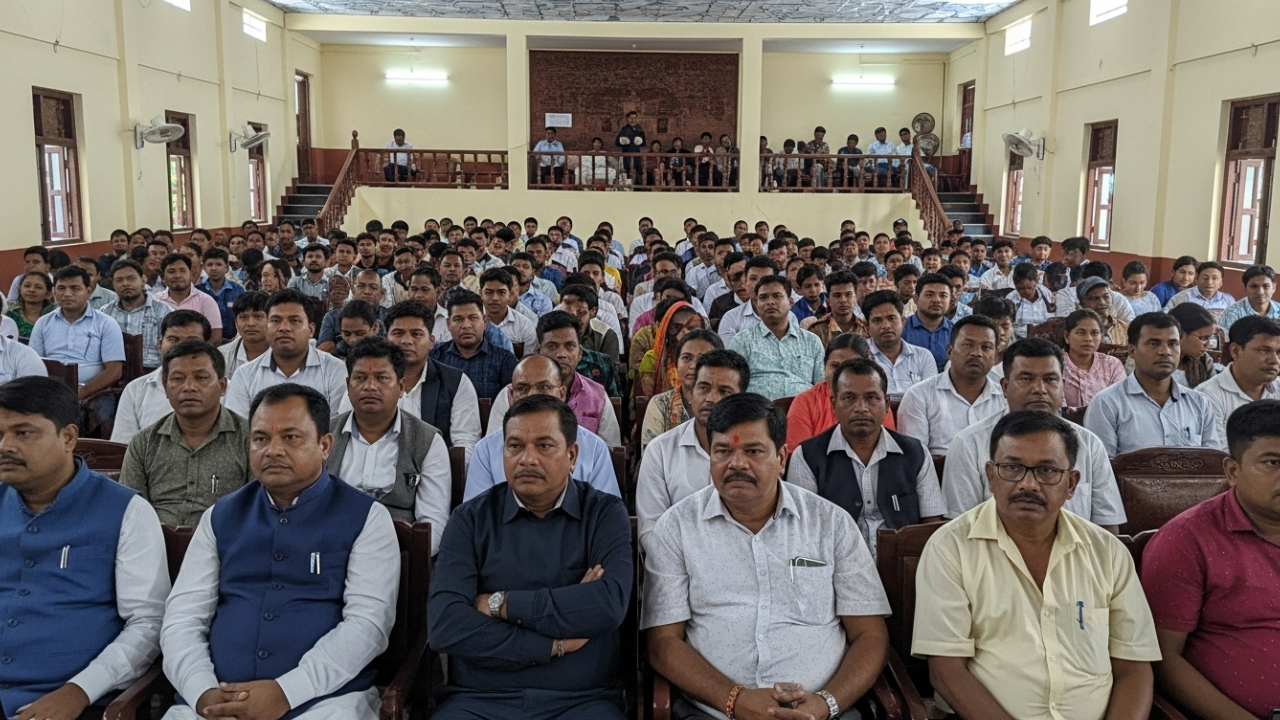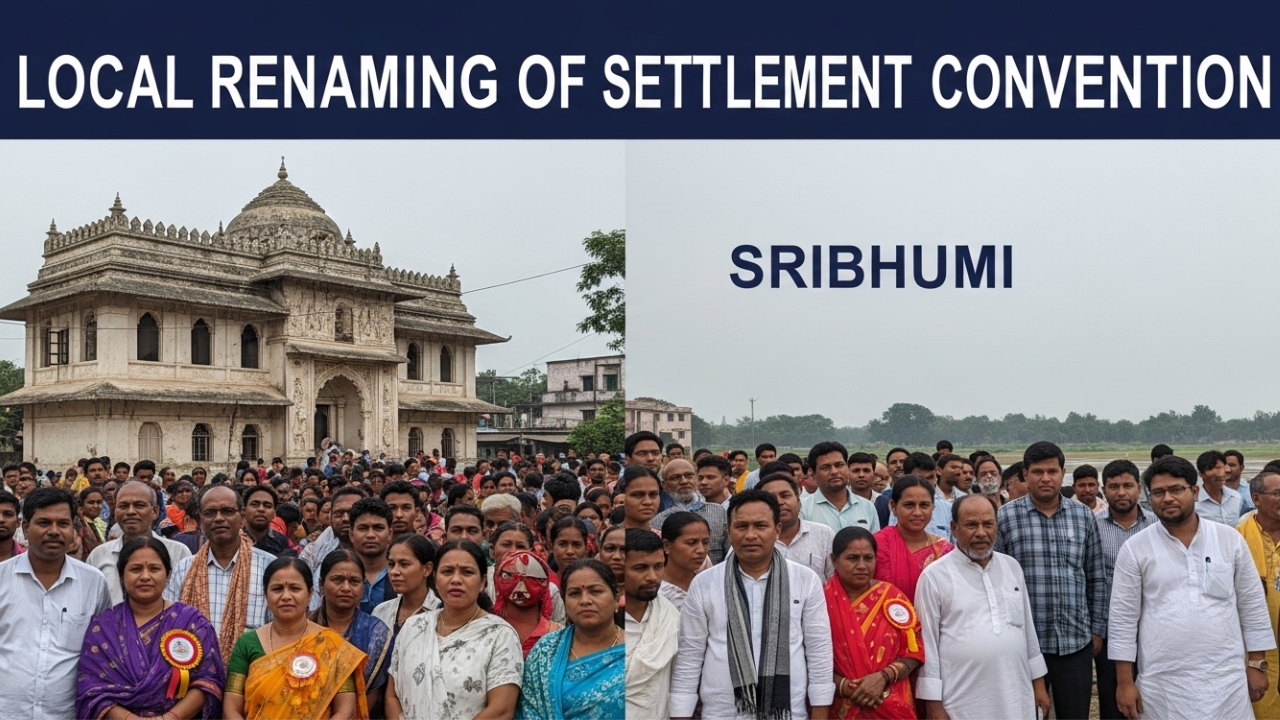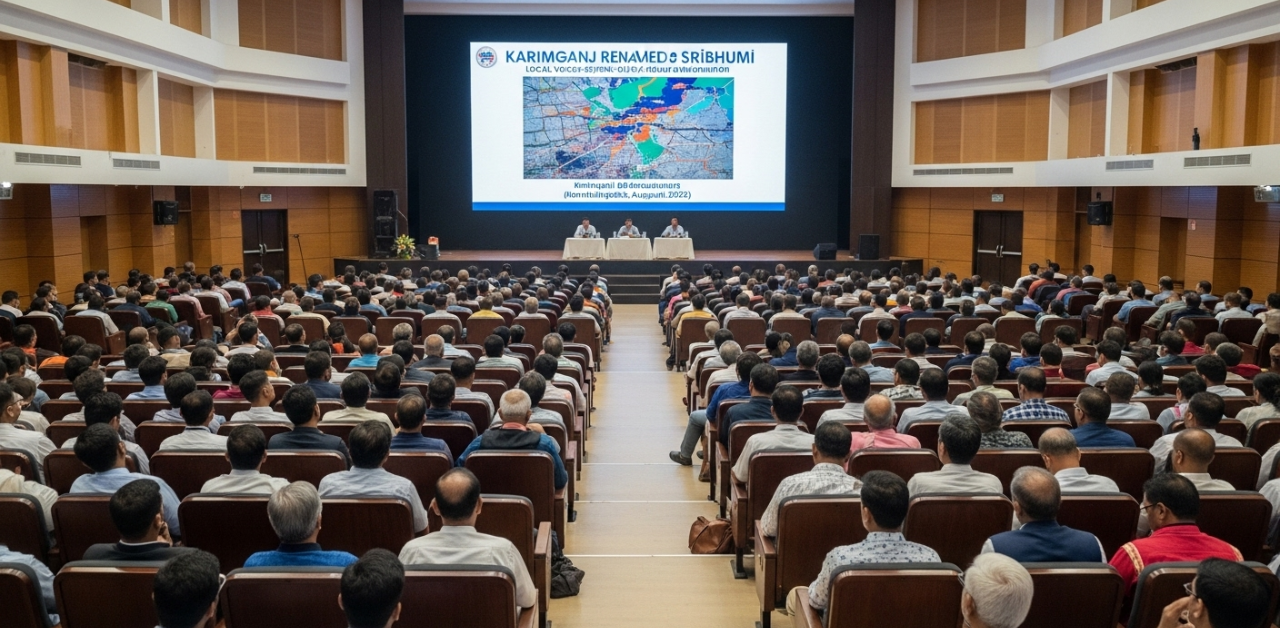Sribhumi vs. Karimganj: Public Gathering at Settlement Convention

Karimganj to Sribhumi: Development Ignored Symbolism The renaming of Karimganj district in Assam to “Shribhumi” has sparked widespread outrage and deep concern across the region.
What the state government described as a routine administrative move has been perceived by the people of Karimganj as a deliberate attempt to erase their history, weaken their identity, and create divisions in a district known for its cultural harmony. The controversy reached its peak when thousands of residents,
intellectuals, and social activists gathered in Maizdi to protest against the decision, marking one of the largest conventions in recent memory.
The renaming issue is not just about a change of nomenclature. For the people of Karimganj, their district’s name carries decades of memories, cultural pride, and emotional attachment. It reflects the struggles and aspirations of communities that have coexisted peacefully despite political and social challenges. Critics argue that by renaming Karimganj, the government has failed to recognise the deep-rooted significance of this name and instead prioritized symbolic politics over genuine development.
Prominent voices such as Nitomoni Saikia, the editor-in-chief of Pratidin Times, and Professor Dr. Tapodhir Bhattacharjee, former Vice-Chancellor of Assam University, openly criticised the government for neglecting real developmental issues. They pointed out how Karimganj still lacks a proper medical college and a full-fledged university, despite its historic institutions and strategic importance in the Barak Valley. Instead of addressing these concerns, the administration focused on renaming the district, raising questions about the government’s priorities.
The protest at Maizdi was not an isolated incident. Earlier, a petition carrying more than 217,000 signatures was submitted to the Himanta Biswa Sarma government, urging it to preserve the original name of the district. Despite this overwhelming show of opposition, the administration moved forward with the renaming decision, which further inflamed public sentiment. Residents saw this as evidence that their opinions and emotions were being sidelined in favour of divisive political strategies.
The general consensus at the convention was that the renaming was less about development and more about fostering divisions. Speakers accused the government of sowing seeds of discord in a district where Hindus and Muslims have lived side by side for generations. The emotional undertones of their speeches reflected a growing frustration: while the people demanded roads, educational institutions, healthcare, and better infrastructure, what they received was a superficial change of name.
This sense of betrayal is amplified by the symbolic value of Karimganj’s name. For locals, it is not just a geographical label but a part of their heritage — tied to historical figures, cultural milestones, and everyday identity. The government’s lack of consultation and apparent disregard for this attachment has transformed what might have been a bureaucratic act into a full-fledged political storm.
The unfolding controversy thus raises larger questions: Should development be reduced to mere symbolism? Can a government ignore the collective will of its people in matters that affect their cultural existence? And, most importantly, what does this decision mean for the future of Assam’s fragile social harmony? These are the debates that continue to resonate across the Barak Valley as the renaming issue takes centre stage in Assam’s political discourse.
The Core of the Controversy
The decision to rename Karimganj as Shribhumi has not been universally welcomed. Instead, it has been widely condemned as:
A divisive political move rather than a step towards progress.
A distraction from real issues, such as education and healthcare.
A neglect of public sentiment, as seen in the ignored 217,000-signature petition.
Voices from the Public Gathering
At the Maizdi convention:
Nitomoni Saikia highlighted the lack of infrastructure in Karimganj.
Dr. Tapodhir Bhattacharjee emphasised the cultural and academic neglect.
Ordinary citizens expressed their pain over the loss of identity.
What Lies Ahead?
The protests show no signs of slowing down. For the residents of Karimganj, this is not merely a matter of semantics — it is about respect, recognition, and justice. The question now is whether the government will reconsider its decision in light of the overwhelming resistance or continue on its chosen path, deepening the rift between authority and the people.
Sribhumi vs. Karimganj: Dispute Over Development and Identity in Karimganj District

Karimganj district to Sribhumi, while promoted as a tribute to cultural heritage, has created significant challenges for local residents in practical, day-to-day life. Beyond the symbolic debates about identity and heritage, the change has triggered administrative confusion affecting essential documents like Aadhaar cards, PAN cards, passports, voter IDs, and even land or ration cards. Citizens who once had “Karimganj” listed on official documents now face the daunting task of updating their identification records to reflect the new district name, Sribhumi. This process has caused widespread anxiety, particularly among low-income families who rely heavily on government services and cannot easily navigate bureaucratic hurdles.
Residents question the benefits of the rename when they are forced to invest time, effort, and sometimes money, to correct information across multiple official platforms. For many, the name change has not translated into any tangible advantage such as improved healthcare, education, or infrastructure. The people of Karimganj, historically underserved in terms of development, are now grappling with administrative burdens instead of receiving concrete improvements to roads, colleges, or medical facilities. Critics argue that the government’s focus on symbolic gestures, such as renaming the district, sidesteps the pressing developmental needs that could truly uplift the local population.
The unrest is compounded by the lack of clear guidance from authorities on how to update documents efficiently. Questions remain unanswered: Who bears the cost of these updates? Will the government facilitate free and accessible services for all affected residents? How long will it take for passports, voter IDs, and ration cards to reflect the new district name? This uncertainty has created frustration and a sense of helplessness among citizens who feel that the policy prioritizes politics over people.
Moreover, the renaming decision has been widely criticized as ignoring decades of legitimate developmental demands. Local institutions such as Karimganj College, founded in 1946, have yet to receive upgrades to university status despite persistent appeals. Proposed healthcare facilities, including a medical college, were placed far from the district town, limiting accessibility. Roads, sanitation, and other civic amenities remain substandard. Many argue that prioritizing a name change over such pressing issues reflects a misallocation of government attention and resources, leaving residents to bear the consequences of both neglect and bureaucratic confusion.
Prominent voices at public gatherings, including journalists and educators, have highlighted that while the government emphasizes heritage, the average citizen struggles with the tangible effects of the change. Low-income families, in particular, face barriers to accessing essential services because documents still list Karimganj, causing delays in pensions, bank transactions, and scholarship distributions. The frustration underscores a wider debate: Can a symbolic gesture like renaming a district ever compensate for years of infrastructural neglect and administrative inconvenience?
The Sribhumi rename demonstrates that policy decisions, while culturally or politically motivated, must also consider their practical impact on citizens’ daily lives. Without comprehensive support mechanisms, residents are left to navigate the administrative aftermath alone, questioning the real benefits of such symbolic initiatives. In essence, the controversy reflects a larger tension between identity politics and developmental priorities in Assam’s Barak Valley region
Administrative Challenges Post-Rename
Documents Affected: Aadhaar, PAN, passports, voter ID, land records, ration cards.
Practical Concerns: Delays in accessing benefits, added bureaucratic costs, confusion among government offices.
Impact on Residents: Particularly burdensome for low-income and rural citizens.
Development vs. Symbolism
Neglected Infrastructure: Colleges, medical facilities, roads, sanitation remain insufficient.
Political Gesture: Name change perceived as a symbolic act overshadowing real progress.
Citizen Sentiment: Frustration over prioritization of renaming instead of tangible benefits.
Public Gathering at Settlement Development Neglected, Symbolism Prioritized – The Karimganj to Sribhumi Debate
Karimganj district to “Sribhumi” on November 19, 2024, during a cabinet meeting chaired by Assam Chief Minister Himanta Biswa Sarma, has brought to the surface long-standing frustrations regarding the neglect of development in the Barak Valley. While the government celebrated the change as a tribute to cultural heritage — citing Rabindranath Tagore’s poetic reference to the region as “Sribhumi” or “the land of Goddess Lakshmi” — citizens and intellectuals argue that it is little more than a symbolic act that distracts from genuine developmental needs.
Karimganj, a district with over 1.2 million residents and a land area of 1,809 sq. km, continues to suffer from infrastructural shortcomings that have hindered its growth.
The district’s strategic location near the Bangladesh border makes it a crucial hub, yet it lags behind in higher education, medical facilities, and transport connectivity. The demand to upgrade Karimganj College (founded in 1946) into a university has been raised for decades, but the state government instead expanded
Guru Charan College in Silchar, only 10 km away from Assam University, bypassing the legitimate aspirations of Karimganj’s students. Similarly, the long-promised medical college was placed far from the district town, at its boundary, creating accessibility issues for residents who had hoped for modern healthcare closer to home.
These realities underscore a pressing contradiction: while Karimganj’s people asked for hospitals, universities, and improved infrastructure, they were given a new name — Sribhumi. To many, this feels like a cosmetic gesture, prioritizing political messaging over the tangible progress that would actually improve lives. The sense of neglect is heightened by the government’s disregard for democratic process. Despite a petition with over 217,000 signatures urging the preservation of “Karimganj,” and subsequent memorandums, rallies, and conventions, the state proceeded without consultation. For a district that has often felt sidelined in Assam’s policy priorities, this episode has become symbolic of a wider pattern of neglect.
The mass convention at Maizdi, organized by groups like “Amra Karimganji,” was more than just a protest against renaming — it was an outpouring of frustration against decades of systemic underdevelopment. Prominent voices such as journalist Nitomoni Saikia and academic Dr. Tapodhir Bhattacharjee articulated this disconnect clearly: why celebrate heritage through a name change when the same heritage institutions — like Karimganj College — remain underfunded and overlooked? Residents perceive the renaming as a political distraction designed to polarize communities while avoiding accountability on governance.
At the same time, supporters of the change insist that the renaming reconnects the region with its deeper Sanskriti (cultural essence) and distances it from what they argue was a name associated with “foreign” influence. The celebration of Sribhumi by certain groups illustrates the political capital that symbolic moves can generate. However, this also intensifies divisions: while some celebrate the cultural narrative, others mourn the loss of identity and lament the state’s misplaced priorities.
Thus, the Karimganj-to-Sribhumi controversy is not just about a name; it embodies the tension between development and symbolism, between what people need and what governments deliver. It raises critical questions about governance in Assam: Should heritage preservation come at the cost of democratic inclusion? And can symbolic gestures ever substitute for real, on-the-ground progress?
The Developmental Concerns
Higher Education Left Behind
Karimganj College (est. 1946) was never upgraded to a university despite decades of demand.
Instead, Guru Charan College in Silchar, only 10 km away from Assam University, received attention, bypassing Karimganj.
Healthcare Gaps
A medical college was sanctioned but placed on the district border, far from the town.
Residents argue this was impractical and neglected the population’s actual needs.
Infrastructure and Connectivity
Poor road conditions and limited investment continue to stifle growth.
Public voices claim that renaming does nothing to address these core issues.
Symbolism vs. Substance
Government’s Stand: Name change honors Tagore’s poetic description and reconnects with heritage.
Public View: Renaming is a divisive distraction from unmet demands in education, healthcare, and jobs.
Political Undertones: Allegations that the decision was communal, targeting the district’s Muslim-linked historical identity.
Resources / References
আমরা করিমগঞ্জী ‘ র ডাকে গণ অভিবর্তনে শামিল হওয়ার আহ্বান ।
Related Article
“Abdus Saboor Tapadar Condemns BJP MLA’s ‘Pakistan’ Remark: A Deep Dive into Karimganj’s Political Landscape”
Article Link: Abdus Saboor Tapadar Condemns BJP MLA’s ‘Pakistan’ Remark“Kabir Ahmed: From Tilabari-Bandarkuna to Karimganj Law College – A Political and Social Biography”
Article Link: Kabir Ahmed: Political & Social Biography“Bijoy Malakar’s Controversial ‘Pakistan’ Remark: Implications for Karimganj’s Communal Harmony”
Article Link: Bijoy Malakar’s ‘Pakistan’ Remark“Momtaz Begum Appointed In-Charge President of Karimganj Mahila Congress: A New Era in Women’s Political Leadership”
Article Link: Momtaz Begum In-Charge President“Advocate Abdus Sabur Tapadar: A Legal Luminary’s Journey from Karimganj to Guwahati High Court”
Article Link: Advocate Abdus Sabur Tapadar Legal Career“Dr. Hifzur R. Siddique: From Karimganj to Aligarh – A Scientist’s Path to Cancer Research Excellence”
Article Link: Dr. Hifzur R Siddique Biography




Pingback: Bandarkona Gp Karimganj High Court Order Landmark Patta 14
Pingback: শ্রীভূমি নাম পরিবর্তন: করিমগঞ্জে ১২ ঘণ্টা বন্ধ ও জনতার প্রতিক্রিয়া ২০২৫
Pingback: Police Brutality NCC Students Injured Arrested in Badarpur